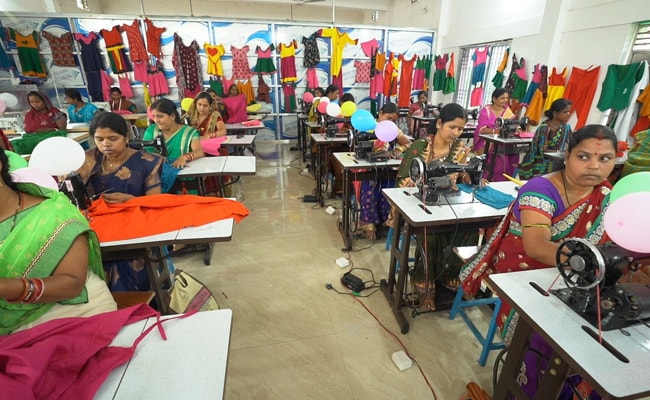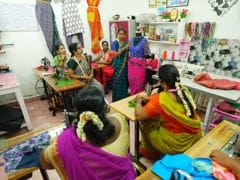- Home/
- From Homes To Businesses: USHA Transforming Lives In Rural Odisha
From Homes To Businesses: USHA Transforming Lives In Rural Odisha

In the tribal belt of Telkoi block in Jagmohanpur district, Odisha, women are weaving not just garments but also their futures. A noteworthy example is Swain, a 33-year-old woman who travels over six kilometers daily to attend a training-cum-production center established by the Odisha Rural Development and Marketing Society (ORMAS). This initiative aims to empower women through skill development and entrepreneurship, in collaboration with Mission Shakti and the USHA Silai School program.
Swain is one of the 30 women working at the production unit specializing in crafting garments primarily for government orders. With dedicated master trainers from the USHA Silai School providing hands-on training, these women learn invaluable skills essential for their livelihoods.
Swain said,
"I had learned a little at home, mainly how to make blouses and dresses. However, after the trainer arrived, I learned comprehensive techniques. I gained knowledge in making blouses, dresses, shirts, pants, kurtis, cushion covers, and school dresses. I love coming here; I've developed a solid understanding of sewing and now know many options."
Empowering Women In The Snow-Capped Mountains: USHA Silai School's Impact In Kargil
The USHA Silai School program has been instrumental in providing tailoring skills to women in Odisha's Bhadrak and Keonjhar districts. It aims to support producer groups like the one in Jagmohanpur by securing government orders and creating mass production avenues. This initiative addresses the pressing need for employment opportunities in tribal regions where livelihood options have traditionally revolved around mining, agriculture, or processing industries.
Shri Kumar Nagabhusan, Chief Development Officer and Executive Officer of Zila Parishad, Keonjhar, said,
"In the tribal belt, many women are eager to engage in activities like sewing, which aligns with their household chores and requires no formal education. While we have ten different activities planned in the industrial park, sewing has been a game-changer, especially when women participate in large numbers. They can work during their free time without adding pressure to their family lives."
Kuni Rani Khuntiya, another participant, learned about the ORMAS and USHA training programs during a self-help group meeting in her village. Realizing she needed to step out and acquire new skills to earn a personal income, she decided to take the plunge.
She said,
"After completing my household chores by 9 AM, I arrive at the training center by 10 and train until 2 PM. In just one month, I've learned a lot. Previously, I couldn't earn much sewing blouses at home, but now, thanks to ORMAS, I can earn 3,000 to 4,000 rupees from sewing and manage my own expenses. I no longer rely on anyone at home."
The USHA Silai School program carefully selects women from self-help groups across villages for a month-long advanced tailoring training. This training raises their skill levels and prepares them to join producer groups, enhancing both productivity and economic viability.
Bijayananda Dash, Programme Coordinator for Odisha, describes how the USHA models empower women,
The Story Of USHA Silai Schools In Jammu And Kashmir
"Many women prefer to set up businesses at home rather than travel far, so we provide training to help them establish small units. With government support for product creation, they benefit from a corpus fund for raw materials. We facilitate group formation to promote a collective approach, and our work models are designed to accommodate their time constraints, recognizing their home responsibilities."
Finding employment that promotes financial independence is crucial for women in rural areas, enabling them to contribute meaningfully to household income and be active participants in the growth and development of their villages, districts, and state. The stories of women like Swain and Kuni highlight the transformative role of USHA Silai Schools. These programs equip women with essential sewing and entrepreneurial skills, opening new avenues for empowerment and societal change. As these women embrace their newfound skills, they are not just redefining their own lives but also fostering growth for their families and communities.
Related Stories
More- Team NDTV | Thursday February 12, 2026
From Ladakh peaks to Assam fringes, Usha Silai School trains tribal women in Turtuk, Kargil & Dakhinkuchi—crafting livelihoods with armed forces, NHPC & NGOs. Stitching national resilience
- Team NDTV | Thursday January 29, 2026
From West Bengal's transgender tailors to Telangana's tribal seamstresses and Meghalaya's embroidery revivalists, Usha Silai School's Kushalta Ke Kadam partners with NIRDPR and state governments
- Team NDTV | Tuesday February 03, 2026
In Odisha's mining heartlands, Mahanadi Coalfields Limited teams with Usha Silai School's Kushalta Ke Kadam and Gram Utthan, empowering tribal women turning them into entrepreneurs
- Team NDTV | Wednesday January 07, 2026
From Madhya Pradesh's stigma to Bihar's child marriages, Usha Silai School's NDTV-backed Kushalta Ke Kadam empowers women like Kalpana and Shabnam to stitch dignity and self-reliance
Adopt a Silai School
About the Initiative

Kushalta Ke Kadam, an initiative by USHA Silai School and NDTV has entered its eighth season. The aim is to empower more women across rural India by teaching them sewing skills and helping them open new doors of opportunities for themselves. The initiative encourages rural women to become financially independent and entrepreneurs by taking up sewing and training others in their respective communities.
Since 2011, the USHA Silai School initiative has trained more than 12 lakh rural women through over 33,000 Silai schools, spanning over 20,751 villages across India.
The women earn Rs. 4,000 – 5,000 per month on an average, with the highest recorded monthly earning being Rs. 84,000 in a month. This earning works as a catalyst towards building their self-confidence, reducing gender inequities, and raising their stature within their families and in society at large.
In Pics

Rebari girls grow up learning traditional embroidery, which along with their new found sewing skills developed at Usha Silai Schools, is helping them earn a living.

Usha Silai School has empowered many rural women to support their family and send their children to school.

The Usha Silai School, established in a small nondescript village that goes by the name of Kottai, is helping empower people from varied communities.

The all-inclusive Usha Silai School Programme covers the entire nation from hamlets tucked between hills to villages cast by the sea.

Vegetables farmers from the Mizoram hills earn very little given the topography of the area. Usha Silai Schools have played an important part in this region by skilling women to financially contribute towards their households.

Usha Silai School learner Lucy has trained seven other women in her community, helping them to become financially independent.

Women like Kaviben from the nomadic Rebari community are finally laying down their roots as they begin to gain financial independence and thereby stability through Usha Silai School.

Usha Silai School, located in the Gujarat's Bhuj village, is enabling rural women to earn as much as Rs. 2,500-4,000 each month.

Usha Silai School, in association with a Gujarat based NGO called Kala Raksha, is trying to bring about a Silai revolution in Bhuj.

Besides training other women from their community, many Usha Silai School learners have become entrepreneurs in their own right.

With sewing becoming easily accessible and lucrative, the silai schools are also helping revive traditional motifs and designs.






